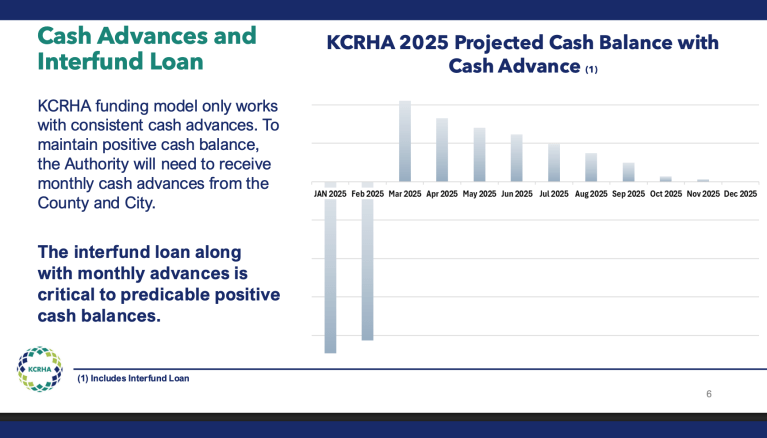KCRHA Holds Closed Session on "Federal Funding Impacts," Approves Loan to Address Deficit Spending
The homelessness authority relies heavily on federal funding from agencies the Trump Administration is already in the process of slashing.

By Erica C. Barnett
During a Thursday-morning meeting of the King County Regional Council's governing board, which includes nine elected officials from around the county, the board went into an extended executive session to discuss what the board's pro tem chair, Seattle Mayor Bruce Harrell, described as unspecified "federal funding impacts." The closed session lasted about half an hour.
Before shutting down the meeting, Harrell announced, "We're going to move into executive session to discuss federal funding impacts pursuant to RCW 42.3 0.110"—the part of the Open Public Meetings Act that includes a list of reasons a government agency can call an executive session. Anyone calling an executive session has to cite a specific exemption from that list, which Harrell did not do.
KCRHA spokeswoman Lisa Edge told PubliCola after the fact that the board had used the "litigation" exemption, which allows closed meetings to discuss current or potential lawsuits. This exemption is fairly common for elected bodies (the Seattle City Council uses it all the time to talk about lawsuits the city is embroiled in), but it's generally included in the written agenda and always stated out loud—not vaguely implied by a hand-waving reference to the entire list of possible reasons for closing a meeting to the public.
It's unclear whether the KCRHA is involved in any lawsuits related to federal funding. (The executive session was not on the agenda for the meeting). But the agency's contracts, and KCRHA itself, will definitely be impacted by cuts to the Interagency Council on Homelessness, the Department of Housing and Urban Development, and the Department of Health and Human Services, among other lifeline federal agencies. Except for a brief discussion in February, KCRHA's governing board has not talked about the impact of these potentially existential cuts during any of its regular public meetings.
By all appearances, KCRHA already operates on a razor's edge. After the board returned from executive session, the agency's finance director, James Rouse, explained that because the authority doesn't receive money from its funders—primarily the city and King County— at the same time that it needs to pay homeless service providers, it operates at a deficit for most of the year, relying on "interfund" loans and cash advances from the city and King County to stay solvent.
"We start off with a zero cash balance," Rouse said, then "we pay our providers, [and] we end up in a negative cash balance" that grows throughout the year while the KCRHA waits for reimbursement. By the end of the year, Rouse said, the authority receives enough money to bring the agency's balance back to zero, and the cycle starts again.
That isn't exactly what happened last year (the authority only had a positive cash balance in August and September, according to a graph presented at today's meeting), and it isn't the pattern the agency's finance staff predicted just two months ago, when they presented a graph showing large deficits in January and February that transformed into positive balances starting in March 2025 and dwindling to zero by the end of this year.
Both graphs are reproduced above; neither includes specific monetary figures, and the legislation authorizing the interfund loan from King County is effectively a blank check. According to Edge, the loan kicks in when the agency's bank account drops into the negative.





